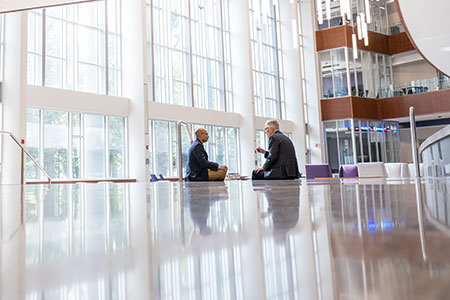The isolation of selling
Marketing researchers analyze social isolation and job performance
By Courtney Roszak
 When Edward Nowlin and Doug Walker sat down with a whiteboard in 2016 to explore social isolation and its effects on sales representatives’ work performance, a worldwide pandemic was not on their radar. Nor did the Kansas State University College of Business Administration researchers expect the phrase “social isolation” to be mainstream or know how it would affect the direction of their research.
When Edward Nowlin and Doug Walker sat down with a whiteboard in 2016 to explore social isolation and its effects on sales representatives’ work performance, a worldwide pandemic was not on their radar. Nor did the Kansas State University College of Business Administration researchers expect the phrase “social isolation” to be mainstream or know how it would affect the direction of their research.
“Before the COVID-19 pandemic, Doug and I thought we were really smart to link sales with the idea of social isolation because nobody was using the term at the time,” said Nowlin, associate professor of marketing. “Then we didn’t seem so smart after COVID-19 began because the term was being used everywhere.”
A salesperson’s role has always been to build relationships with customers and grow new or existing business, but doing so can require frequent travel and remote work, which can create an isolated environment. When the COVID-19 pandemic began, environments became even more isolated for external sales representatives because operations transitioned from in person to virtual. Employees handled customer relations by phone or video conferencing, which are impersonal forms of communication.
As an employee becomes more isolated, it is more difficult to connect with co-workers or the organization.
For several years, Nowlin and Walker, also a K-State associate professor of marketing, have collaborated with Nawar Chaker of Louisiana State University and Nwamaka Anaza of Southern Illinois University Carbondale, to conduct multiple studies using 233 surveys and 27 in-depth, personal interviews. The research found salespeople who experience isolation at work lack rich interaction with co-workers. That results in lower levels of job-related knowledge, informal communication and loyalty to the company, which all negatively affect performance.
In their observations, the researchers bridged two theories. The organizational socialization theory looked at how the values of the firm provided guidance in navigating the workplace social structure, while the social learning theory focused on how individuals gained information through social interaction. “As the salesperson becomes isolated, the camaraderie between co-workers is less common and it’s harder to build relationships,” Walker said. “If the salesperson feels disconnected from those within the firm, they can feel disconnected from the firm itself and it can affect the loyalty to the firm — which is something that would naturally flow for those connected to co-workers.”
The researchers have published their work in the journal Industrial Marketing Management. Walker and Nowlin have continued their research throughout the pandemic. They have expanded into the different effects of isolation between external and internal sales departments and the influence managers have on creating a sense of belonging.